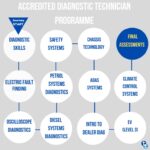The auto repair industry is vital to North Carolina’s economy, keeping residents mobile and ensuring vehicles remain in safe, working condition. For those in the auto repair business or consumers seeking assistance, understanding the role of local government in supporting these services is crucial. This article explores whether North Carolina local governments directly support auto repair services and what forms of assistance might be available.
While North Carolina’s state government sets the broader legal and tax framework for businesses, including auto repair shops, the direct support for auto repair services at the local government level is not typically in the form of direct financial aid or subsidies specifically for car repairs. Local governments in NC, such as city and county administrations, primarily focus on broader economic development and regulatory functions that indirectly impact the auto repair sector.
Indirect Support Mechanisms from Local Governments:
Local governments in North Carolina contribute to a healthy environment for auto repair businesses through several indirect methods:
- Small Business Support Programs: Many NC counties and cities offer resources for all small businesses, and auto repair shops can benefit from these. These programs can include workshops on business management, marketing assistance, navigating local regulations, and sometimes access to small business loans or grants. While not auto repair specific, these resources help these businesses thrive.
- Economic Development Initiatives: Local governments are invested in economic growth and job creation. Auto repair businesses, as employers and service providers, contribute to this. Local economic development corporations or departments may offer assistance in areas like site selection, navigating permitting processes, and workforce development, all beneficial for auto repair businesses looking to establish or expand.
- Workforce Development and Training Programs: Some local governments partner with community colleges or technical schools to offer workforce training programs. While not always exclusively focused on auto repair, these programs can train individuals in automotive technology and mechanics, creating a pipeline of skilled workers for local auto repair shops. Local initiatives might support apprenticeships or on-the-job training programs in the automotive field.
- Infrastructure and Zoning: Local governments are responsible for infrastructure like roads and utilities, which are essential for all businesses, including auto repair shops. Zoning regulations set by local governments determine where auto repair businesses can operate, influencing their accessibility and operational environment. Reasonable zoning and well-maintained infrastructure are fundamental supports.
- Consumer Protection and Regulations: Local governments may enforce certain consumer protection regulations that impact auto repair services, ensuring fair practices and building consumer trust in local businesses. While regulatory, this framework supports a healthy market for reputable auto repair shops.
- Taxation Framework: While the original article linked focuses on the state-level sales and use tax related to repair services, it’s important to acknowledge that local governments also levy local sales taxes. Understanding the combined state and local tax obligations is crucial for auto repair businesses. The original document clarifies what constitutes taxable repair services under NC law, which is essential knowledge for compliance and business planning. This regulatory clarity, provided by the state and implemented within the local context, is a form of indirect support by establishing the rules of operation.
Direct Financial Assistance for Consumers:
It is less common for NC local governments to offer direct financial assistance to consumers specifically for auto repairs. Social service programs are often managed at the county level, but these typically focus on essential needs like housing, food, and healthcare. Emergency assistance programs might, in rare cases, provide limited support for critical car repairs if it directly impacts an individual’s ability to maintain employment or access essential services, but this is not a standard or widespread program.
Finding Local Resources:
To investigate specific local support in your area of North Carolina, you should:
- Contact your City or County Government: Reach out to the economic development department, small business assistance center, or county manager’s office. Inquire about small business programs, workforce development initiatives, or any resources relevant to auto repair businesses.
- Check Local Chamber of Commerce: Chambers of commerce often act as a bridge between local government and businesses. They can provide information on local programs and resources.
- Explore Community College and Technical School Partnerships: See if local educational institutions have partnerships with the county or city that support automotive training or apprenticeships.
- Review Local Government Websites: Many NC local governments have websites detailing their services and programs. Look for sections on economic development, small business, or community resources.
Conclusion:
While NC local governments may not offer direct subsidies specifically for auto repair services, they play a significant role in fostering a supportive environment for these businesses through broader economic development initiatives, small business resources, workforce training, and infrastructure. Understanding these indirect support mechanisms and exploring local resources is key for both auto repair businesses and consumers seeking to navigate the local landscape in North Carolina. The state-level tax regulations, as outlined in resources like the original article, further define the operational context for these essential services within each locality.
References:
- Repair, maintenance, and installation services – North Carolina General Statutes, providing the legal definition of repair, maintenance, and installation services for tax purposes.

